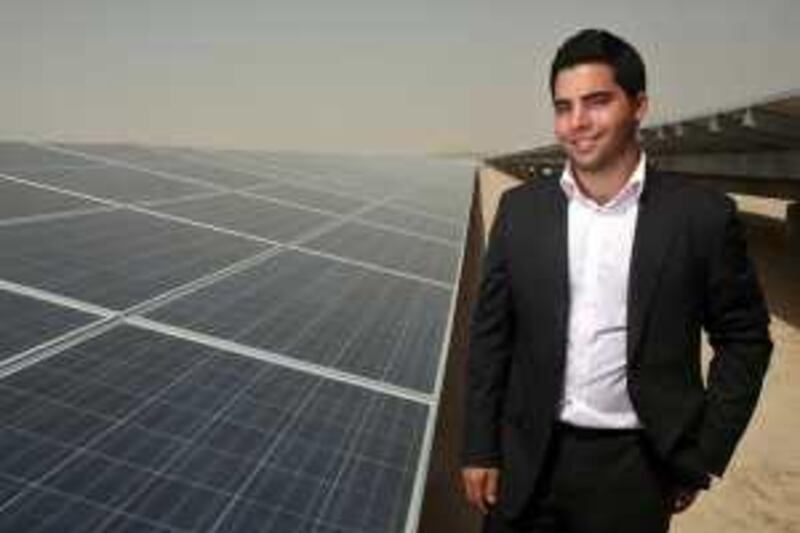As far as Ayham Mkalalati is concerned, solar power should be up there with oil in the league of national energy resources and he should know - the young electrical engineer is playing a key role in Masdar, Abu Dhabi's carbon-neutral project. ABU DHABI // Ayham Mkalalati has come a long way since he helped to build a solar-powered car at university in Toronto. The 25-year-old Syrian-Canadian has a more ambitious project now - an entire solar-powered community.
Born in Canada but raised in Abu Dhabi, Mr Mkalalati was only the second engineer to be hired by Enviromena Power Systems, the Abu Dhabi-based solar systems integrator, which has designed and built a solar plant on behalf of Masdar. Credit for the idea of having Abu Dhabi turn to renewable energy belongs to high-profile consultants, Masdar officials, and people in the upper reaches of government, but Mr Mkalalati is one of the key individuals working to turn that dream into reality.
"People talk about the region's oil supplies but there are in fact two main sources of energy here. Sun, alongside oil, should be considered mainstream," he said. "Abu Dhabi is taking a very bold step. The next generation here will have solar power integrated as a way of life." It was a one-seater car that first piqued Mr Mkalalati's interest in solar power, when he was earning his electrical engineering degree at the University of Toronto. Then in his second year of study, he was one of a team of 50 students and staff working to build the vehicle.
"It looked like an alien spaceship," he said. The car was made of light, sturdy carbon fibre, and covered in photovoltaic (PV) panels that convert sunlight into electricity. Mr Mkalalati had to work out the best way to position the PV panels on the vehicle, which was eventually driven in Toronto, reaching a speed of 40kph. A road accident in which the student behind the wheel was seriously injured spelt the end of that particular project, but did nothing to dent Mr Mkalalati's enthusiasm for solar energy. He spent some of his third year at university studying the properties of semiconductors. One such material is crystalline silicone, which is used in the bulk of PV panels.
In 2006 Mr Mkalalati returned to Abu Dhabi, and although he spent a year in a different field, he did not give up hope of a career in solar energy. He kept watch on the Government's fledgling sustainability initiative, which includes building the world's first large-scale carbon-neutral community on the outskirts of the capital. "I moved back here when Masdar was just starting," he said. "I used to read everything about it and tried to find out who was working on it."
That diligence eventually led Mr Mkalalati to Sander Trestain, vice president of Enviromena, who ended up hiring him for the new company. "I was the second engineer to join. It was a very small team then [in March 2007]," said Mr Mkalalati. "Since then, the company has grown six-fold." His duties as technical analyst include developing solar-energy concepts for customers, working on detailed designs, liaising with suppliers and visiting sites.
His first task on a recent Sunday, for example, was monitoring the performance of Masdar's solar PV plant - one of Enviromena's most important projects (others are subject to contractual confidentiality). The plant has a maximum capacity of 10 megawatts and started feeding the Abu Dhabi electricity grid on May 31. Arriving at a final design took more than 100 drawings, and once that part of the project had been completed, the team had to supervise the subcontractor, whose people had never worked on a project of this kind before.
"As the project evolved, we went on site," he said. "That was a big part of it, being on site and making sure things were going according to the drawings. At one point, our whole engineering team was on site, teaching workers." That process of instruction had been effective, even if the methods were sometimes unusual. At one point, he said, one of his superiors deliberately broke a solar panel to demonstrate just how delicate the modules are.
As the plant had a total of 87,777 solar modules, the demonstration was worth it, he said. Mr Mkalalati, who tracks the facility's performance in real time through a computerised monitoring system, said that with an efficiency average of 75 per cent, the plant was "working the way it was expected and even better". Critics of solar power argue that the UAE is too hot and dusty for the technology to work efficiently. But Mr Mkalalati said these objections could be exaggerated.
Modules performed best at 1,000 watts per square metre of solar radiation and a temperature of 25°C. So the efficiency of the panels would fall in summer temperatures approaching 50°C, but this would be partly offset by the increased amount of sunlight hitting the panels, he said. Another fear is that solar electricity may disrupt the grid, but Mr Mkalalati said: "The grid is stable and working fine".
It is easy to be persuaded by Mr Mkalalati's enthusiasm for solar power. He veers away from moral issues - such as responsibility to look after the planet - and focuses instead on science. Efficiency is a term that crops up frequently, underlying his practical approach to the issue. "The best thing solar can do is ease the grid when there is peak power required," he said. "In summer, for example, the load on the system is very large, the cost of running this incremental energy is huge. This is when solar makes a lot of sense."
vtodorova@thenational.ae






